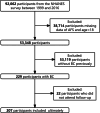Impact of age at first sexual intercourse on the development and prognosis of breast cancer: A two-sample Mendelian randomization study with NHANES validation
- PMID: 40760508
- PMCID: PMC12323919
- DOI: 10.1097/MD.0000000000043676
Impact of age at first sexual intercourse on the development and prognosis of breast cancer: A two-sample Mendelian randomization study with NHANES validation
Abstract
This study examines the potential link of age at first sexual intercourse (AFS) with breast cancer (BC). A two-sample Mendelian randomization (MR) method was leveraged to examine the possible link of AFS with BC. The causal effect of AFS on BC was primarily appraised by an inverse variance weighted method. Sensitivity analyses were applied to appraise the stability of MR results, involving Cochran Q test, MR-Egger intercept analysis, outlier test (MR-pleiotropy residual sum and outlier), and leave-one-out method. The National Health and Nutrition Examination Survey was leveraged to validate the impact of AFS on BC prognosis. Kaplan-Meier curves, Cox regression analysis, and restricted cubic splines were generated to appraise the link of AFS with BC. The inverse variance weighted exhibited a positive causal effect of AFS on BC (odds ratio = 1.237, 95% confidence interval = 1.077-1.420, P = .003) with reliable and stable results. Nevertheless, other methods revealed no notable association. In addition, none of the above sensitivity analyses revealed any violation of the MR assumptions. The results from the investigated sample cohort of 92,062 women showed that a high AFS was tied to worse outcomes in BC patients (hazard ratio = 1.148, 95% confidence interval = 1.048-1.258, P = .003). This correlation remained consistent across various subgroups. The study suggests that there is a noticeable link between AFS and BC, providing further evidence for predicting the risk and prognosis of BC.
Keywords: Mendelian randomization; NHANES; breast cancer; female reproduction; first sexual intercourse.
Copyright © 2025 the Author(s). Published by Wolters Kluwer Health, Inc.
Conflict of interest statement
The authors have no conflicts of interest to disclose.
Figures
Similar articles
-
[Multi-omics Mendelian randomization study on the causality between non-ionizing radiation and facial aging].Zhonghua Shao Shang Yu Chuang Mian Xiu Fu Za Zhi. 2025 Jun 20;41(6):594-603. doi: 10.3760/cma.j.cn501225-20240830-00320. Zhonghua Shao Shang Yu Chuang Mian Xiu Fu Za Zhi. 2025. PMID: 40588408 Free PMC article. Chinese.
-
Increased risk of hypertrophic scarring in estrogen receptor-positive breast cancer: a bidirectional mendelian randomization study.Arch Dermatol Res. 2025 Jan 20;317(1):299. doi: 10.1007/s00403-024-03737-z. Arch Dermatol Res. 2025. PMID: 39833481
-
Association between high-density lipoprotein cholesterol and type 2 diabetes mellitus: dual evidence from NHANES database and Mendelian randomization analysis.Front Endocrinol (Lausanne). 2024 Feb 22;15:1272314. doi: 10.3389/fendo.2024.1272314. eCollection 2024. Front Endocrinol (Lausanne). 2024. PMID: 38455653 Free PMC article.
-
Endometrial injury for pregnancy following sexual intercourse or intrauterine insemination.Cochrane Database Syst Rev. 2022 Oct 24;10(10):CD011424. doi: 10.1002/14651858.CD011424.pub4. Cochrane Database Syst Rev. 2022. PMID: 36278845 Free PMC article.
-
Cost-effectiveness of using prognostic information to select women with breast cancer for adjuvant systemic therapy.Health Technol Assess. 2006 Sep;10(34):iii-iv, ix-xi, 1-204. doi: 10.3310/hta10340. Health Technol Assess. 2006. PMID: 16959170
References
-
- Bray F, Laversanne M, Sung H, et al. Global cancer statistics 2022: GLOBOCAN estimates of incidence and mortality worldwide for 36 cancers in 185 countries. CA Cancer J Clin. 2024;74:229–63. - PubMed
-
- Nicholson WK, Silverstein M, Wong JB, et al. Screening for breast cancer: US preventive services task force recommendation statement. JAMA. 2024;331:1918–30. - PubMed
MeSH terms
Grants and funding
LinkOut - more resources
Full Text Sources
Medical




